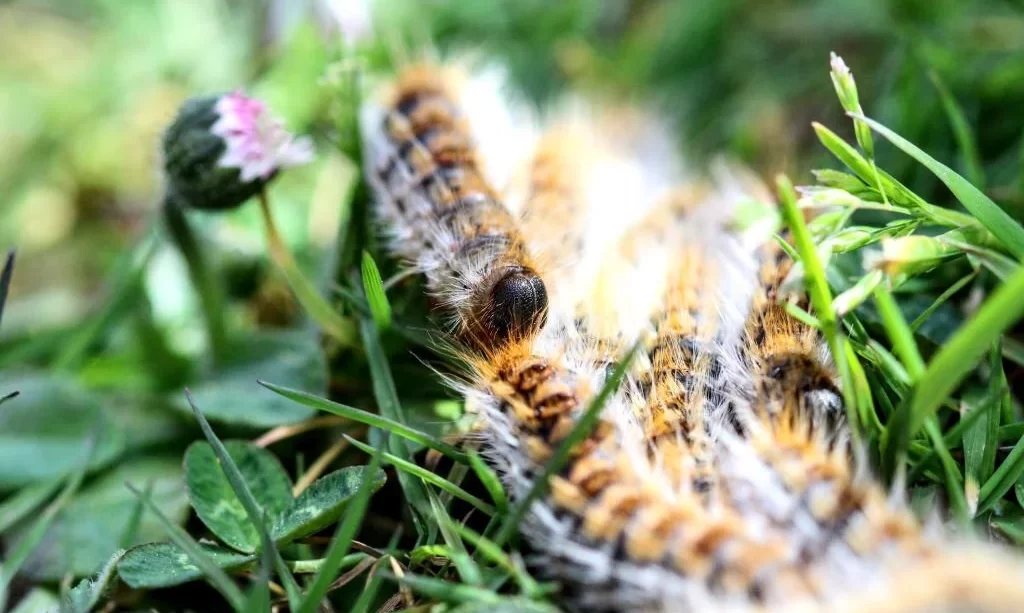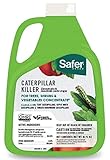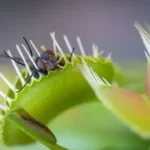Picture a beautiful garden or a serene yard, now imagine it marred by unsightly silken tents and voracious caterpillars. If you’ve encountered tent caterpillars, fret not! This guide is here to empower you with straightforward methods to bid these bothersome pests farewell. Let’s dive in and reclaim your outdoor haven.
- Safer Caterpillar Killer can be utilized on a broad range of plants, from vegetables to ornamentals, making it a versatile choice for any garden enthusiast seeking safe and efficient pest control.
- Kills caterpillars, gypsy moth larvae, worms and cabbage loopers. Safely eliminates caterpillars and various other insect pests from your garden or plants safe and efficient.
- Safer Caterpillar Killer is a potent 16 oz insecticide designed to eliminate a wide range of destructive pests including caterpillars, beetles and other garden insects, safeguarding your plants.
- The 16 oz size comes with a convenient spray nozzle, making application effortless. Simply spray the affected plants, leaves, and stems to create a protective barrier against invasive insects.
- This product boasts a friendly formulation, ensuring that your garden remains free from harmful residues while effectively managing insect populations.
Identify the Problem
Before we roll up our sleeves, it’s crucial to be sure you’re dealing with tent caterpillars. These crafty creatures construct distinctive silky nests in the branches of trees or shrubs. These tents act as both shelter and cafeteria for the hungry caterpillars, protecting them as they munch away.
Manual Removal
Let’s roll up our sleeves and get hands-on! To tackle tent caterpillars, start by carefully inspecting your plants for those telltale silky nests. Once you spot them, gently pluck them off and dispose of them far from your garden. Remember, it’s like tidying up their makeshift homes – you’re taking away their hideout.
Natural Predators
Nature has its own superheroes, and some of them have a voracious appetite for tent caterpillars. Ladybugs, lacewings, and certain bird species are nature’s pest control squad. Consider attracting these beneficial insects to your garden by planting flowers and providing bird-friendly spaces.
Horticultural Oil Spray
Imagine creating a slippery barrier that pests just can’t cling to. Horticultural oil spray does exactly that! It suffocates tent caterpillars, making it hard for them to breathe. Spritz a safe oil spray onto affected areas, and watch those bothersome critters lose their grip.
- INSECT KILLER – This pest control is great for use on aphids, leaf miners, leafhoppers, thrips, spider mites, scales, whiteflies, mealybugs and many more. It gives poor control for caterpillars & worms. However, it does control eggs of all insects.
- FOLIAGE PROTECTOR – Our insecticide is designed for use on a variety of trees & plants including corn, potatoes, apples, almonds, avocados, citrus, peaches, pecans, blackberries, figs, pineapple and more.
- DORMANT & GROWING SEASON SPRAY – This product is designed for safe use during both the dormant and growing season. Application during each season will increase the effectiveness of the product’s insect control.
- FOR ORGANIC GARDENING – OMRI Listed for Organic Gardening. Organic Materials Review Institute reviews products to ensure it complies with all organic standards under the USDA’s National Organic Program (NOP)
- EASY TO USE – This product mixes readily with water. It should be applied using a pump up or trigger sprayer. Use enough spray solution to completely penetrate the leaf canopy and cover both top and bottom of all leaves until wet without runoff.
Pruning Infested Branches
Sometimes, a little snip is all it takes to save the day. If you spot branches hosting a tent caterpillar party, grab your gardening shears and remove those sections. This not only gets rid of the caterpillars but also helps your plant redirect its energy to healthier growth.
Insecticidal Soap
Picture this: soap that’s tough on bugs but gentle on your plants. Insecticidal soap is like a superhero for your garden. It targets tent caterpillars and other pests while leaving your plants unharmed. Just give those little critters a soapy surprise, and watch them wave goodbye.
Conclusion
Tackling tent caterpillars might seem daunting, but with the right steps, it’s like a breeze in your garden. By identifying the problem, using natural predators, horticultural oil spray, and insecticidal soap, you’re armed and ready to rescue your plants. With your newfound knowledge, those pesky tent caterpillars don’t stand a chance. Your garden will thrive, and you’ll enjoy a pest-free oasis of greenery.






